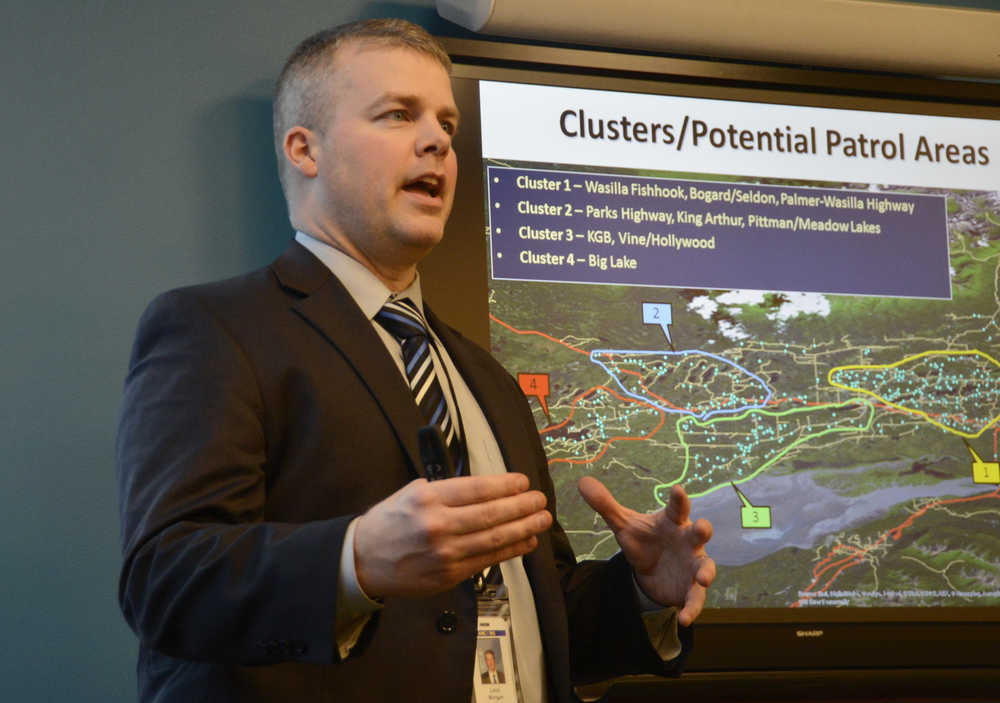Area residents learned that names, phone numbers, work histories and credentials are only a click away during a background check workshop held Tuesday.
Hosted by the Soldotna Chamber of Commerce and coordinated by Alaska State Troopers Director Colonel James Cockrell and Lt. Dane Gilmore, the workshop held at the Kenai National Wildlife Refuge Visitor Center addressed the various methods of checking an individual or company’s background for law enforcement, business and personal use.
Gilmore said new search tools have been developed since the workshop was first held a year or two ago. This time, its content was more applicable to businesses and retailers than it was in the past.
“It was kind of an add-on to some other public information requests … we’ve had with the builders association and things along that line for particular types of what they thought were the things that were causing them losses in their business,” Gilmore said. “And a lot of their assumptions were incorrect, so this was to help point them in the directions of, ‘Where are you really experiencing your loss? Where are your real risks at?’ so they can use those tools to protect themselves.”
A few dozen participants learned how to navigate several public databases and useful websites, including Courtview, the Department of Natural Resources, Alaska’s licensing website and more. Leon Morgan of the Alaska Information Analysis Center demonstrated how to use the Alaska Organized Retail Crime Alliance, a site dedicated to information sharing for businesses and law enforcement groups to prevent retail crimes.
The site is accessible only to registered businesses who have proved that they are working with local police to monitor and stop thefts and other retail crimes.
“Retail loss prevention officers, or managers within, like, a Target or a Fred Meyer or something, that have access to pretty good surveillance systems, can post incidents onto the site in almost a real-time environment,” Morgan said.
Once registered, businesses can post pictures and other details when they are victims of theft for other retailers and police groups to see. The goal is for those entities to be able to track repeat offenders or be on the lookout for those who commit crimes and migrate to other towns, Morgan explained.
Partnerships between businesses and law enforcement officials don’t need to organize under an official name or nonprofit, but would have to be verified by someone from the Alaska Information Analysis Center who would come to the peninsula to help get the group registered, Morgan said.
“It could be as basic as a couple cops sitting there with a couple of loss prevention officers saying, ‘Hey, this is what we want to do in this area,’ but we have to have some kind of, obviously, vetting process,” he said.
There are no registered groups using this site on the Kenai Peninsula, and the site itself is only about a year old, Morgan said.
Katie Jacobson, the member services coordinator for the Soldotna Chamber of Commerce, said she plans to work on forming a group with the Soldotna Police Department and the Alaska State Troopers that could use the site in the future.
“I think that our retail businesses could really benefit from that website,” Jacobson said. “It’s just a matter of organizing the troops and getting it all together.”
Law enforcement officials, those involved in retail and residents alike found useful information in the workshop. Sgt. Mike Zweifel, who is currently stationed at the peninsula’s Girdwood Post, said the presentation was a good way to learn how to gather information through public sites like social media, which can be helpful when trying to connect suspects to crimes or each other.
“As we’re investigating crimes and we develop potential suspects, along with the records that we can get as a law enforcement officer, there’s a lot of information that we can get through public domains, which are not necessarily inside law enforcement types of information,” Zweifel said.
Amber Gilliland works for Access Alaska, a nonprofit that provides services to people with disabilities. She said the organization has found out it was presented with stolen items in the past, and wanted to make sure the organization would be eligible to use the Alaska Organized Retail Crime Alliance website.
Following Morgan’s presentation, Christy Blaum, an analyst supervisor, took workshop participants through a number of different public websites and search tools.
“Google is your friend,” she said, before showing residents how to narrow and expand their average Google search criteria.
Other topics she covered included reverse searching phone numbers, aggregating information about a person’s social media accounts and verifying photos and military status.

